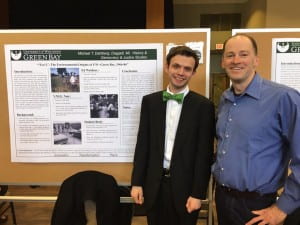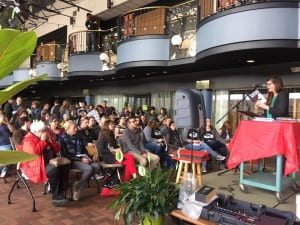If one were to ask us students, “What are the Humanities?” More often than not, we wouldn’t be able to answer that. That was my experience talking to fifth graders and representing the History Club and the Ancient and Medieval Humanities Club at the mini OrgSmorg hosted by Phuture Phoenix last Fall 2017. The definition of “humanities” covers a variety of subjects including languages, history, philosophy, literature, and more. Merriam-Webster defines it as, “the branches of learning (such as philosophy, arts, or languages) that investigate human constructs and concerns as opposed to natural processes (as in physics or chemistry) and social relations (as in anthropology or economics).”
UWGB states it as such, “The humanities comprise those fields that study human creations of all sorts.” I think this definition is more accurate and representative of the study of the humanities. What is the study of literature, for example, without history or language and vice versa? The humanities as a field of study is truly a beautiful thing in that it spans across almost all fields and has real world, modern applications.

Student Michael Dahlberg presented his research on the origins of UWGB’s Eco-friendly reputation with Professor David Voelker at the Academic Excellence Symposium in April 2017.
One can see that evidenced at UWGB. The Ancient and Medieval Humanities Club teamed up with the History Club and Engineering Club to build and launch a catapult. The English Honor Society, Sigma Tau Delta, hosts biweekly book discussions on fascinating titles such as Coraline by Neil Gaiman. Professor Stefan Hall hosts mead and beer brewing events. You can watch foreign films or brush up your French, German or Spanish with fellow students and professors. You can listen and contribute to discussions on a wide range of topics alongside community members downtown. Or watch your professors get into heated philosophical debates from the Reformation while personifying Luther and Erasmus. If exploring ways to apply your study of humanities to career fields is your interest, you can do an internship and find yourself doing any number of things, from teaching English to people from all over the world, to shadowing a lawyer in court, to learning how to introduce school kids to snakes at the Neville Public Museum’s reptile exhibit. You can even spend the summer venturing abroad to explore World War I trenches in France, Germany, and Belgium. There are so many opportunities to get involved with the Humanities program and the programs it relates to!

The first annual Untitledtown Book and Author Festival began with the Sheepshead Review launch party.
When I began my academic career here in Fall 2014, the History Club was starting up again. I worked in the Archives and Area Research Center which at the time was beginning to digitize their collections. Now there’s a Viking House on campus! The English department started UntitledTown, an annual book and author festival! Even the programs name changed from “Humanistic Studies” to “Humanities,” since this program and its disciplinary programs are all fields within the Humanities as well as this title being more widely recognizable. To sum, the Humanities are blossoming at UWGB, pulling in more curious students and preparing them for a future of excitement, creativity, and wonder!
